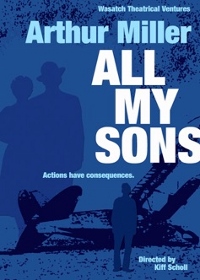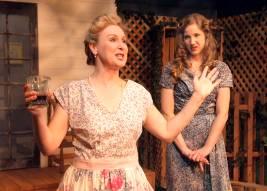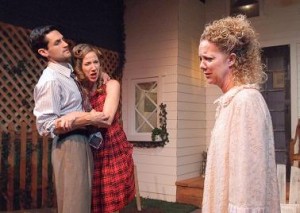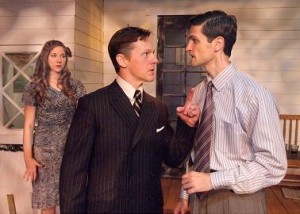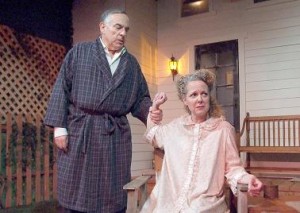ALL MY PRAISE
All My Sons, now showing in a red-hot production at the Raven Playhouse, is Arthur Miller’s seminal 1946 work about a seemingly functional all-American family with secrets that threaten to crack its very foundation.
The time may be WWII, but the themes are shockingly contemporary: profiteering, lack of integrity, deceit, and judgment. (Miller even takes on the Military Industrial Complex long before Eisenhower even warned of its existence.) American consumption as we know it was well under way, and the Keller family in All My Sons will learn the price they must pay for the “money-money-money-money” earned for things they probably never needed. Miller warns us that addiction to familial comfort leads to emotional and spiritual discomfort; this, in turn, threatens to eviscerate the comfortable American family.
Thus we open curtain on the backyard of the prosperous Keller family: Father Joe (Mark Belnick), mother Kate (CaroleAnne Johnson), and son Chris (Nicholas S. Williams). The second son, Larry has been Missing In Action for three years, but his mysterious disappearance propels the tension: Is he still alive? Did Joe’s munitions factory play a part in his disappearance? Will Larry’s old girlfriend, Ann (Lauren Dobbins Webb) couple with Chris, now that she has returned after an extended absence?
No more plot summary is necessary as you will want to let this masterful ensemble tell the tale themselves. Even those familiar with the play will thrill at the pairing of a perfect cast with a perfect script that feels eerily tailor-made for them: Matt Shea portrays neighbor Frank adroitly; as his sad, gossipy wife Lydia, Joanie Ellen’s warm laughter perfectly belies the forlorn woman underneath; Kevin Ashworth perfectly embodies Miller’s suggestion that another neighbor, Dr. Jim, be played “with a wisp of sadness that clings even to his self-effacing humor.” His wife, Sue, is played with startling accuracy by Mary Carrig, and David Kirkpatrick plays Ann’s brother, George, with a conflicted, revengeful spirit that hurls the tension of the plot into high gear. Certainly, Miller’s ghost tapped director Kiff Scholl on the shoulder during the casting session and said, “Them.”
You can sense the weight-bearing pressure on Miss Johnson’s Kate, who is still not reconciled with ghosts of the past, and the nervous reservations of Miss Webb’s Ann, who is ready to move into the future. You may want to hold them, comfort them, or shake them out of complacency, but you will be too riveted to turn your gaze from them.
Our protagonist, Chris, balances well with our antagonist, his father Joe; but Mr. Belnick, though not a weak link, is the only discrepancy I have with the casting. In this, its stellar inaugural production, Wasatch Theatrical Ventures has seen fit to cast Mr. Belnick, its founding artistic director, in the pivotal role of Joe (clearly a precursor to Willy Loman in Death of a Salesman). This is a complex character: grave yet loving, stolid yet conflicted, uneducated yet successful; although Mr. Belnick may play angry or distant at the right times, he offers these moments in a presentational manner – they don’t ring true because we don’t sense them as organic.
It is Nicholas S. Williams as Chris who astounds with his authentic vulnerability – it is the performance that dreams are made of: his listening, reacting, internalizing, and discovery should be studied by acting students near and far. There isn’t a second of falsehood. If you ask why you should seek out small, legitimate theatre in Los Angeles, Mr. Williams is the reason. Watch an actor at the top of his game close up.
All of the actors relate so well to each other, it is almost ballet-like. Certainly, credit must be given to director Scholl. There is an intense subtlety to his production that reminds me why Elia Kazan was so revered; Mr. Scholl has that astonishing ability to turn psychological, interior phenomena into external behavior. No actor outshines another; Mr. Scholl’s steady hand allows his thespians to complement each other. How often will you get a chance to see that?
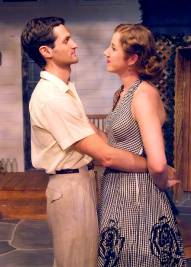 Pitch-perfect authenticity rarely occurs in small theatre. The detail in Sarah Register’s costumes is amazing, right down to the perfect hairstyles. And don’t think this reviewer didn’t notice that Ann’s new dress was impeccable while Kate’s dress looked worn, as if she had been tugging at it with worry. Although the Raven has fairly ghastly sight-lines, Davis Campbell’s gorgeous backyard set allows plenty of room for the well-focused placement of Mr. Scholl’s actors.
Pitch-perfect authenticity rarely occurs in small theatre. The detail in Sarah Register’s costumes is amazing, right down to the perfect hairstyles. And don’t think this reviewer didn’t notice that Ann’s new dress was impeccable while Kate’s dress looked worn, as if she had been tugging at it with worry. Although the Raven has fairly ghastly sight-lines, Davis Campbell’s gorgeous backyard set allows plenty of room for the well-focused placement of Mr. Scholl’s actors.
In a 1981 essay, Arthur Miller revealed his belief that each audience member carries about with him (or her, implicitly) an anxiety or a hope which is his alone and isolates him from mankind, and that the function of a play is to reveal him to himself so that he may touch others. A visit with The Kellers, All My Sons’s mid-western, middle-class family, reveals anxieties we can all relate to, such as falling in love, gossip, regrets, uncertainty, and loss – and when you leave this astute rendering of Classic American Theatre, you may find yourself wanting to touch others, not just because you witnessed a compelling, satisfying theatrical event, but because you are inspired to reveal some truth about yourself.
Wasatch Theatrical Ventures’ mission to produce great American plays at the highest artistic level in the intimacy of small theatre at affordable prices has been fully realized. Bravo to them and to producer Racquel Lehrman (of Theatre Planners). May you have a most successful run and a most triumphant future.
photos by Ed Krieger
All My Sons
Wasatch Theatrical Ventures
Raven Playhouse
5233 Lankershim Blvd in North Hollywood
ends on July 25, 2010
for tickets, call 323.960.4420 or visit Wasatch
